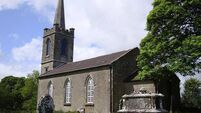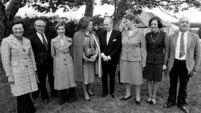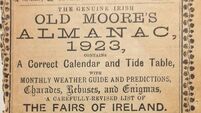The old ballads of ‘Cinty’ Loftus

William 'Cinty' Loftus wrote ballads about the villages in the foothills of the Ox Mountains.
William ‘Cinty’ Loftus was born in Graffy around 1881. He was a farmer and labourer who worked for Jack McGloin of Greyfort in Currower. He would often boast that Jack McGloin had “blue blood in his veins”. In their leisure time, they would go out into the hills around Graffy and Carradoogan hunting for game.
William was a ballad composer who would observe people, places and events and compose songs about them. The people could be Anthony Flannelly, Johnny Mulherin or Sandy Durcan and the places were Graffy, Ellaghmore, Ballymore and Lissardmore to mention but a few. These were all areas around the parishes of Attymass and Bonniconlon. The events could be the opening of a drain, the striping of a farm, the building of a road or a row in the local hall.
There were other people in the locality who liked to compose songs and they would come to ask assistance from William if they were experiencing difficulty and he would add in the lines they were looking for. On one occasion, Harry Slack from Carradoogan was looking for lines to finish a lament that he was writing for Thomas Naughton, a neighbour who had died. His nickname was ‘Tarpey Tom’. ‘Cinty’ thought for a moment and he said:
‘Cinty’ wrote a song about the fight at Goodwin’s Hall in Ellaghbeg on St Patrick’s Night and he commenced the composition with the lines:
He also composed a ballad about the building of a road from Ginley’s Cross to the townland of Ellemountain. It began as follows:
Then he goes on to describe the various people who were involved and he laments the fact that because he is a Graffy man he will not get a job on the building of the road.
He challenged local merchant and councillor Martin Bernard Durcan, or ‘Sandy’ Durcan, when he bought the farm at Lissardmore in the early 1940s.
The song praises the land of the Lissardmore farm and he writes that the plains of Moyne nor the bogs of Allen cannot compare with sweet Lissardmore. He also praises Graffy in another song of that title by writing:
In another song, he writes:
Johnny Mulherin had a shop and guest house in Attymass, as well as a travelling shop. Cinty composed a ballad called Johnny Mulherin’s van where he wrote:
He also wrote a ballad about the ghost of Ballymore Lake and many other ballads. Unfortunately, many of them were lost with the passing of his daughters Mary and Bridget over 20 years ago.





